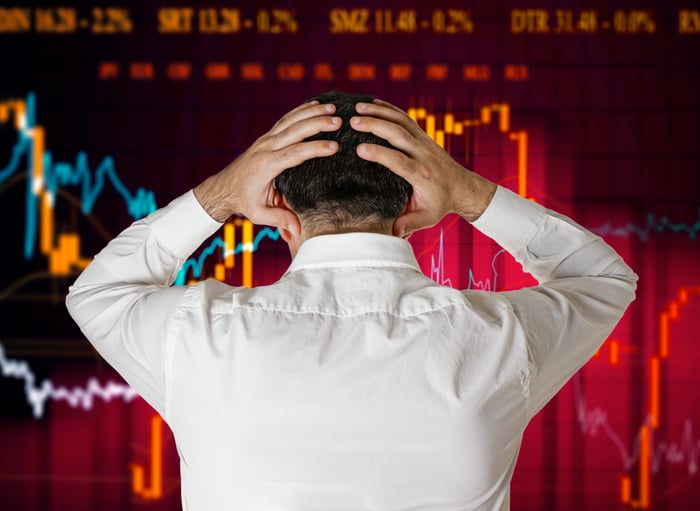Another stock market crash is coming. That's not hyperbole. Stock market crashes are predictable. Since 1950, the S&P 500 has crashed, or lost at least 10% of its value, on 38 occasions -- once every 1.84 years. So you can be pretty sure it will happen again.
The unpredictable part of stock market crashes is the timing. It's impossible to know when stocks will tank or how long a bear market will last. But regardless of when it happens, a market crash isn't something to lose sleep over. Here's why you shouldn't panic next time the market plummets.

Image source: Getty Images.
1. You'll only lose money if you sell.
Technically, your net worth rises and falls with the stock market. But you only lose money if you sell at a loss. As long as you've invested with a time horizon of five years or more, meaning you haven't put money in the stock market that you'll need for at least five years, there's no reason to worry. Your investments have plenty of time to recover.
How much your portfolio is worth on any given day doesn't matter. It's long-term performance that counts. Don't cash out while everyone else is panicking and you'll be just fine.
2. The best days of the stock market often follow the worst ones.
If accurately timing the market were possible, of course everyone would do it. But for those who lack psychic powers, the best strategy is to stay put in the stock market, knowing history tells us some great days are ahead.
A J.P. Morgan analysis found that six of the 10 best days for the S&P 500 index between 1999 and 2018 occurred within two weeks of the 10 worst days. There's a high cost when you're not invested for those good days. Missing the 10 best days of the market over those 30 years would have reduced annual returns for a hypothetical $10,000 investment from 5.62% to 2.01%, reducing the portfolio's value by about half.
3. It's an opportunity to buy more.
If you love a bargain sale when you shop, why not invest in stocks when they're on sale? Granted, investors often think they'll jump on the opportunity when stocks nosedive -- but fail to do so because it's scary to throw money into a plunging market.
But if you believe a company will be successful in the long run, a crash is a golden opportunity to scoop up more shares on the cheap. Plus if you invest in dividend-paying stocks, by buying more shares, you'll naturally buy more dividends that you can reinvest in a company you believe in.
4. A recovery is inevitable.
Whether a recovery will be V-shaped or U-shaped or W-shaped is debatable. But what's pretty clear is that a recovery eventually happens. It just may not happen as quickly as you want it to.
All 38 of those stock market crashes that have happened since 1950 have been followed by a rebound. While prolonged downturns like the Great Recession, which stretched from December 2007 to June 2009, are no doubt etched in your memory, it's important to remember that most corrections are relatively short -- about six months on average.
5. You know it's coming, so you can prepare.
Since you know another crash is inevitable, don't be caught off guard when it happens. Focus on stockpiling at least six months' cash in an emergency fund. That ensures you won't have to sell investments while they're down due to a short-term cash crunch. If you're well-prepared for an emergency, consider setting aside even more money to invest so you can lock in low share prices.
Another smart move is to review your risk tolerance while the stock market is still strong. If you opt to rebalance your allocation to be more aggressive or conservative, it's best to do it while you can still fetch top dollar on your investments -- plus you won't have to make emotion-driven decisions when the market does crash.
A market crash is something to be very afraid of if you have a short-term mindset. But true investors focus on companies they'll still want to own years from now, if not forever. If you stay focused on your long-term goals, there's no reason to fear a stock market crash.




